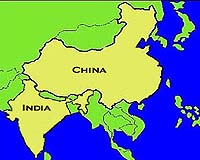| . |  |
. |
Hong Kong (AFP) Nov 19, 2010 Hong Kong's government on Friday unveiled its latest attempt to cool the red-hot property market, amid public anger at spiralling prices and fears highlighted by the IMF of a real estate bubble. Financial Secretary John Tsang announced a sliding scale of new stamp duties effective midnight Friday aimed at restraining what he called "short-term speculative" inflows into the glitzy financial hub's property market. "These are extraordinary measures under exceptional circumstances. Our aim is to curb short-term speculative activities and to reduce the risk of any asset bubble," Tsang told journalists. The territory's de facto central bank also announced new restraints on mortgage lending, mostly aimed at the luxury end of the market. The measures, which had been flagged in advance, dented Hong Kong's Hang Seng stock index, with property developers' shares falling as much as 2.5 percent. The densely populated city of seven million is famous for its sky-high residential rents and super-rich tycoons. It notably attracts wealthy buyers from mainland China looking for a relatively safe place to invest with high living standards. The International Monetary Fund this week urged Hong Kong to rein in soaring prices, amid fears that overheating is spreading from high-end luxury properties to the general market. Under the levies outlined by Tsang, anyone reselling a property within six months of purchase would be subject to a hefty 15 percent stamp duty. A 10 percent duty would apply to sales within six-to-12 months and five percent on sales within 12-24 months. The head of the Hong Kong Monetary Authority outlined another scale of measures that effectively lowers the proportion of an individual purchase that can be made with a mortgage -- mostly applicable to high-value purchases. "We are very concerned that the housing market and consequently the mortgage market will become even more exuberant, thereby exposing the banking system to higher risk," said Norman Chan. Luxury home values in the former British colony recently topped their pre-1997 Asian financial crisis peak, according to government data released in October. Friday's announcement marks the latest in a series of property cooling measures. Stamp duty on luxury property was hiked by half a percentage point in April to 4.25 percent, while a number of government land auctions have been held to increase supply. But prices have crept ever higher, and are up 20 percent in the past year. The IMF warned in a report on Thursday that, "depending on the amplitude of the upswing, the resulting downturn could prove both protracted and painful". Concerns have been amplified after the Federal Reserve unveiled a massive stimulus package to kick-start the US economy, raising fears that a flood of speculative money could overheat Hong Kong's volatile asset markets. The Hong Kong dollar is tied to the greenback, although the IMF reiterated its support for the city's currency system, calling it a "robust anchor of monetary and financial stability". Buggle Lau, chief analyst at Hong Kong property broker Midland Holdings, said the latest measures could show quicker results. "Last time, the government's measures, including boosting land and property supply, were aimed at lower prices in the long term. The new stamp duty will no doubt dampen the enthusiasm of speculators," he said. "It will force many of them to reconsider reselling to make quick bucks." In October, Hong Kong's leader announced a halt to automatic residency for wealthy property buyers, in a move that analysts said was aimed squarely at cash-rich investors from mainland China. At a rowdy legislative session that was dogged by about 200 protestors denouncing high property prices, Chief Executive Donald Tsang said: "Housing is currently the greatest concern of our people."
Share This Article With Planet Earth
Related Links The Economy
 Chinese, Indian growth easing, weak yuan a danger: OECD
Chinese, Indian growth easing, weak yuan a danger: OECDParis (AFP) Nov 18, 2010 Emerging Asian giants China and India are set for further high growth, but the weakness of the yuan is a grave threat to emerging economies in the region, the OECD said on Thursday. The South Korean economy is also set to expand at a brisk pace, but Japan's economy will slow significantly, the OECD said in its six-month outlook for leading economies. The OECD's chief economist Pier Carlo ... read more |
|
| The content herein, unless otherwise known to be public domain, are Copyright 1995-2010 - SpaceDaily. AFP and UPI Wire Stories are copyright Agence France-Presse and United Press International. ESA Portal Reports are copyright European Space Agency. All NASA sourced material is public domain. Additional copyrights may apply in whole or part to other bona fide parties. Advertising does not imply endorsement,agreement or approval of any opinions, statements or information provided by SpaceDaily on any Web page published or hosted by SpaceDaily. Privacy Statement |